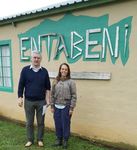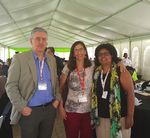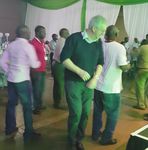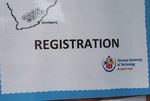COLLABORATING AND DISSEMINATING SCIENCE: SHARING IDEAS, PROJECTS AND LEARNINGS - PROF. (HP) DR. LAMANAUSKAS (A LITHUANIAN) IN SOUTH AFRICA
←
→
Page content transcription
If your browser does not render page correctly, please read the page content below
2016, Vol. 13, No. 1
COLLABORATING AND DISSEMINATING
SCIENCE: SHARING IDEAS, PROJECTS AND
LEARNINGS – PROF. (HP) DR. LAMANAUSKAS
(A LITHUANIAN) IN SOUTH AFRICA
Angela James
University of KwaZulu-Natal, South Africa
In South Africa, Education policy documents abound with statements promoting
scientific and technology literacy (DoE, 2002). In spite of this demand, a global trend
is developing which reveals a sharp decline in students who are interested in the natural
sciences (Areepattamannil, Freeman & Klinger, 2010). In an effort to increase students’
interest in Science, various mechanisms are employed both nationally and internationally.
Also, the effective, contextually related implementation of Natural Sciences in the
Foundation, Intermediate and Senior schooling phases is a problematic that is presently
being researched, and programmes for the professional development of student teachers
are being revised to respond to this issue. The re-curriculation of all programmes at UKZN,
School of Education re-focuses our efforts in curriculum design on how to teach Natural
Sciences in schools, in preparing learners for the 21st century. Our current countries’
responses to external testing TIMMS bears strong evidence for a need to intervene and
explore avenues to effectively engaging Natural Sciences teachers and researchers in
tertiary institutions on actions to be planned and implemented. In these initiatives an
important aspect to consider is the role of teachers as they are regarded as the change
agents in any education system. In exploring teacher intervention initiatives, Dr Angela
James applied to the National Research Foundation for funding to invite Prof. (HP) Dr.
Vincentas Lamanauskas, Director of the Scientia Socialis, Chairman of the Scientific
Methodical Centre “Scientia Educologic, and Professor and Head researcher at Šiauliai
University, Lithuania to South Africa.
Prof. Lamanauskas is a specialist in his field of Natural Science education in
Central and Eastern Europe, where he has explored teaching, learning, and engaged in
collaborative research on researching and promoting Natural Sciences. He was invited
to South Africa to engage and collaborate with researchers in Natural Science education
and to initiate research in the field. In developing and disseminating research, his work in
writing and publishing is significant, as he has an extensive list of articles, is an Editor in
Chief of eight international journals, member of the Editorial Board of ten international
journals, presented many workshops, and works collaboratively with international
colleagues on the preparation of scientific articles and academic writing for journals. Since
the collaboration also focused on research projects, his expertise in the European Union
programme HORIZON2020 and at the Agency for Science, Innovation and Technology
(MITA) in Lithuania served to inform on the funding and signing of a Memorandum of
Understanding between the University of KwaZulu-Natal and Šiauliai University.
Prof. Lamanauskas arrived in South Africa, at O. R. Tambo International Airport, in
Johannesburg, on the 14th January and was whisked directly to the South African Association
of Mathematics, Science and Technology Education (SAARMSTE) Conference, in
Pretoria. This is an annual conference, in January, for teachers and researchers in the
fields of Mathematics, Science and Technology education. The conference organisers
requested that he present at the conference that afternoon. His presentation on SCIENCE
33GAMTAMOKSLINIS UGDYMAS / NATURAL SCIENCE EDUCATION. ISSN 1648-939X
Figure 6. Prof Lamanauskas with a field officer Figure 7. Dr Angela James with
at Entabeni Communications a field officer.
Environmental Education Centre.
His visit to and work at UKZN concerned a university-wide presentation for
the University Teaching and Learning Office (UTLO) on “A MULTIDIMENSIONAL
MODEL FOR THE EXPLORATION OF POSITIVE AND NEGATIVE EFFECTS OF
SOCIAL NETWORKING WEBSITES AS PERCEIVED BY STUDENTS.” Reflecting
on the seminar, Professor Lamanauskas said, “I really enjoyed presenting the workshop,
and more so the questions and collaboration. I am glad that the academics are interested
and willing to engage around social media.” Staff present indicated the importance of
strategies to consider when using ICT and the ‘Flipped Classroom’ ideas were shared.
This presentation raised many discussions among colleagues about how to engage students
on a deeper level using our learning management system (LMS - MOODLE). The video
recording of Professor Lamanauskas’ seminar is available on the Teaching & Learning TV
YouTube channel at www.youtube.com/utlotv
36GAMTAMOKSLINIS UGDYMAS / NATURAL SCIENCE EDUCATION. ISSN 1648-939X
Figure 9. MUT staff after the two presentations.
A person cannot come to Durban and leave without eating our famous food, a Bunny
chow. So, before departing Prof Lamanauskas ate our famous food, with lots of water –
the chillies were too hot. Neither can a person come and not go to Ushaka – to fight the
Anaconda. He did it!
Figure 10. “Fight with the Anaconda”. Figure 11. Famous food – a Bunnychow.
382016, Vol. 13, No. 1
In conclusion, the wealth of collaboration is an aspect that we all need to work with
to a greater extent. The sharing and intense engagement was so enriching for all who were
engaged in any part of this collaborative venture. So, South Africa, why would you want
to go there? A great place and exceptionally wonderful people – we share, learn and show
gratitude. This has been a phenomenal experience and I must say I am so thankful to Prof
Lamanauskas for his willingness to travel to unknown places (where lions roam the streets)
and to be so engaging with all whom he came into contact with.
I do show appreciation and I thank the South African National Research Foundation
who funded this trip thorough the KIC Grant (NRF/KIC).
Received: May 16, 2016 Accepted: June 08, 2016
Angela James
PhD., Cluster Leader in Science and Technology Education, Senior Lecturer, Co-Faculty Advisor:
ENACTUS, CU 139, Main Administration & Tutorial Building, University of KwaZulu-Natal,
Edgewood Campus, Durban, South Africa.
E-mail: jamesa1@ukzn.ac.za
39You can also read



























































